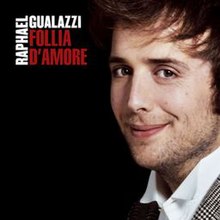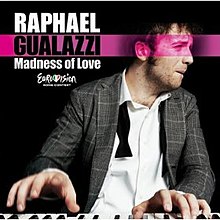Follia d'amore
| "Follia d'amore" | ||||||||||||||||||||||||||||||||||||||
|---|---|---|---|---|---|---|---|---|---|---|---|---|---|---|---|---|---|---|---|---|---|---|---|---|---|---|---|---|---|---|---|---|---|---|---|---|---|---|
 |
||||||||||||||||||||||||||||||||||||||
| Single by Raphael Gualazzi | ||||||||||||||||||||||||||||||||||||||
| from the album Reality and Fantasy | ||||||||||||||||||||||||||||||||||||||
| Released | 16 February 2011 | |||||||||||||||||||||||||||||||||||||
| Format | Digital download | |||||||||||||||||||||||||||||||||||||
| Recorded | 2010 | |||||||||||||||||||||||||||||||||||||
| Genre | ||||||||||||||||||||||||||||||||||||||
| Length | 3:35 | |||||||||||||||||||||||||||||||||||||
| Label | Sugar Music | |||||||||||||||||||||||||||||||||||||
| Writer(s) | Raphael Gualazzi | |||||||||||||||||||||||||||||||||||||
| Producer(s) |
|
|||||||||||||||||||||||||||||||||||||
| Raphael Gualazzi singles chronology | ||||||||||||||||||||||||||||||||||||||
|
||||||||||||||||||||||||||||||||||||||
|
||||||||||||||||||||||||||||||||||||||
"Follia d'amore" (Madness of love) is a song by Raphael Gualazzi. It was the winner of the Sanremo Music Festival 2011 in the newcomer artists' section and also won the Critics' "Mia Martini" Award for newcomers.
On 19 February 2011, Gualazzi was chosen by a specific jury among the participants at the Sanremo Festival to be the Italian entry for the Eurovision Song Contest 2011 in Düsseldorf, Germany. The song won second place in the contest, surpassing most expectations. It was the first Italian entry at the Eurovision Song Contest in 14 years, having last entered in 1997. The song was performed in both Italian and English, as "Madness of Love".
The song is included in the soundtrack of the movie Manuale d'amore 3, directed by Giovanni Veronesi. It also received a nomination for the Nastro d'Argento 2011 for Best Original Song.
Written by Raphael Gualazzi and produced by Gualazzi himself with Ferdinando Arnò, "Madness of Love" is a stride piano song with swing, R&B and blues influences, characterized by a retro style inspired by the American popular music of the 1920s. Gualazzi described the song as the "perfect synthesis of the musical world that inspired me, from Art Tatum to Duke Ellington and Oscar Peterson, the stride piano, an evolution of ragtime, a genre with which I got in touch when I was twenty, and I immediately loved it. I later tried to mix this genre with my classical music education and with the Italian vocal style".
...
Wikipedia

